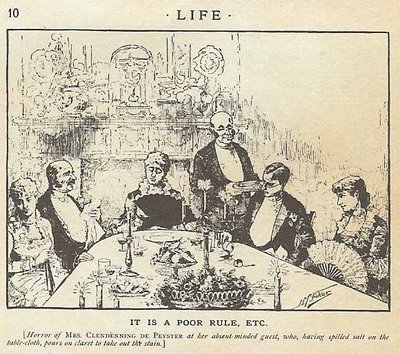 I know, the image really has nothing to do with what I am writing about, but it is one I found over the weekend, and I thought it was fun--besides, how else do you remove a salt stain?
I know, the image really has nothing to do with what I am writing about, but it is one I found over the weekend, and I thought it was fun--besides, how else do you remove a salt stain?At some point in the last year, I started reading Tocqueville's "Democracy in America," and while I was enjoying it, things got in the way, and I stopped near the beginning of Volume 2, though I am reading the Library of America version, so that is more an indicator for earlier editions than a physical break in the book. Aside from all this, I decided to take it with me as something to read at the gym while doing cardio, since there really isn't any point to just going nowhere for 30 minutes while making all the effort to do so. This book lays flat, which is one of the advantages it held when I chose my reading material.
"Aristocratic nations are by nature inclined to restrict the limits of human perfectibility unduly, whereas democratic nations sometimes stretch those limits more than they should." (Vol. 2, pt. 1, Chapter 8) Sounds almost like "bleeding edge" technology to me.
"When a small number of men are concerned with the same things at the same time and form a group whose membership does not change, it is easy for them to agree on certain primary rules, which each of them must then take for his guide. If the subject that concerns these men is literature, strict laws will soon be applied to works of the mind, and no deviation from these laws will be tolerated." (Vol. 2, pt. 1, Chapter 13) Does this in any way explain why most of the innovative literature of the 20th century originated in Europe? I don't know, but he is so full of nuggets like these that it makes reading him a joy, even if I don't have the patience to memorize it all.
No real exciting stuff going on today, other than resuming the Tocqueville.
No comments:
Post a Comment